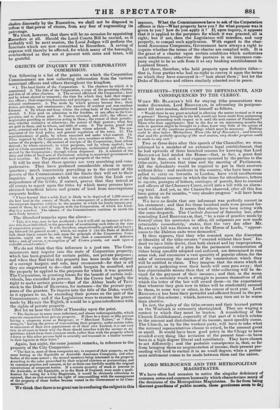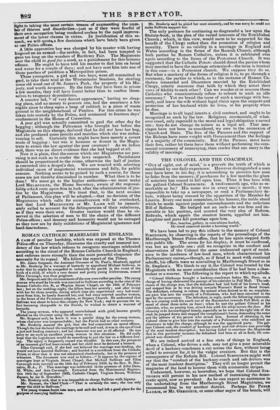LORD MELBOURNE AND THE METROPOLITAN MAGISTRATES.
WE have often had occasion to notice the singular deficiency of common sense and common humanity which characterizes many of the decisions of the Metropolitan Magistrates. So far from being discreet guardians of public morals, these gentlemen seem to dej light in taking the most certain means of augmenting the num- ber of thieves and disorderhes—just as if they were fearful of their own occupation being rendered useless by the rapid improve- ment of the lower classes in virtue. In justification of this re- mark, we will quote, a few decisions which have lately been given at oar Police-offices. A little apprentice boy was charged by his master with having lingered on an errand—the urchin, in fact, had been tempted to gaze too long on the wonders of Bartlemy Fair. The Magistrate sent the child to gaol for a week, as a punishment for this heinous 'offence. He ought to have told his master to diet him on bread and water for a couple of days; and not have sent him into one of those porches of perdition a Metropolitan prison. Three youngsters, a girl and two boys, were all committed to gaol, to take their trial at the Westminster Sessions, for stealing some old wood out of St. James's Park, the property of his Ma- jesty, and worth twopence. By the time they have been in prison a few months, they will have learnt better than to confine them- selves to twopenny depredations. A country lad, " of very decent appearance," having no sleep- ing place, and no money to procure one, had the assurance a few nights since to sleep upon a heap of rubbish in a piece of waste ground in the neighbourhood of Pimlico. For this crime he was taken into custody by the Police, and sentenced to fourteen days' confinement in the House of Correction.
A poor girl was actually committed to gaol the other day for begging; although the Policeman who brought her before the Magistrate on this charge, declared that he did not hear her beg, and she produced some pencils and matches which she was endea- vouring to sell. Certainly this might have been merely a covert mode of begging : but was it humane or decent in the Magis- trate to strain the law against the poor creature? As we before said, there was no direct evidence that she had begged at all. Now it is plain, that the course which our Magistrates are pur- suing is not such as to render the laws respected. Punishment should be proportioned to the crime, otherwise the hall of justice is converted into a despot's den. We are wearied with selecting individual eases of magisterial wantonness and folly, for public censure. Nothing seems to be gained by such a course, for these cases are not thereby diminished in number. What then is to be done? We must go to the higher authorities—we must make Lord MELBOURNE, the Home Secretary, aware of the responsi- bility which rests upon him to look after the administration of jus- tice by the Magistrates. We trust that, in the next session of Parliament, this plan will be adopted,—that no decision of the Magistrates which calls for animadversion will be overlooked, but that Lord MELBOURNE or Mr. LAMB will be immedi- ately called to account for the delinquencies of their subalterns, as if they were their own. Greater caution would then be ob- served in the selection of men to fill the chairs of the different Police-offices ; and decency and humanity would not be outraged as they now are by daily exhibitions of Magisterial ignorance and hard-heartedness.























 Previous page
Previous page